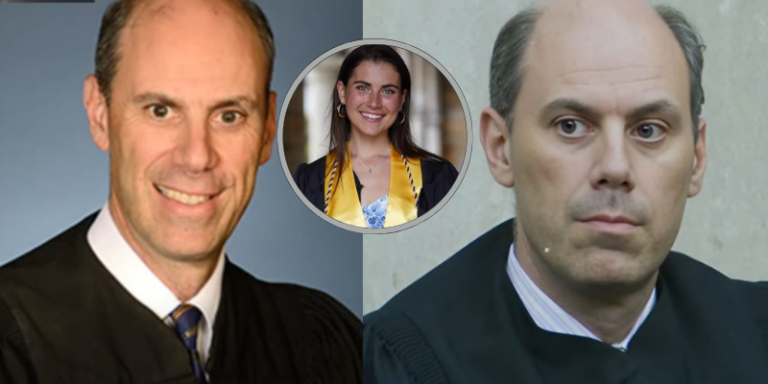Few tales better illustrate the increasingly blurred line between politics and private life than that of Judge James “Jeb” Boasberg, the federal judge who is currently garnering national attention for stopping contentious deportation flights. Unexpectedly, though, the judge isn’t the only one who has come under scrutiny. His daughter, Katharine Boasberg, and wife, Elizabeth Leslie Manson, have been dragged into a storm they never agreed to.
His family has unexpectedly become a flashpoint in recent weeks as Judge Boasberg‘s decisions from the bench have made headlines. Even though their actions had nothing to do with his decisions, commentators are now carefully analyzing them to look for bias. In today’s political environment, where even tangential ties can turn into national controversies, this pattern is remarkably familiar.
Judge James Boasberg & Family
| Category | Details |
|---|---|
| Full Name | James Emanuel “Jeb” Boasberg |
| Date of Birth | February 20, 1963 (Age: 62) |
| Spouse | Elizabeth Leslie Manson (married in 1991) |
| Children | Katharine Boasberg (Capacity Building Associate, Partners for Justice) |
| Education | St. Albans School (1981), Yale University, University of Oxford, Yale Law School |
| Judicial Appointment | Appointed by President Obama in 2011; Unanimously confirmed (96–0) |
| Current Role | Chief Judge, U.S. District Court, District of Columbia |
| Prior Roles | Associate Judge, D.C. Superior Court (appointed by George W. Bush); former homicide prosecutor |
Elizabeth Leslie Manson: Quiet Philanthropist, Reluctant Subject of Controversy
Like many active citizens, Elizabeth Manson has been a silent supporter of progressive causes, a personal political donor, and an active participant in civic life for over thirty years. Her over $10,000 in contributions to Democratic candidates, however, are now being portrayed as problematic and as a possible indication of her husband’s political inclinations.
This scrutiny seems noticeably overblown in the context of judicial impartiality. By culture and code, judges are taught to make decisions based on facts rather than family. Even though there is no proof that Manson ever had any influence over or involvement in her husband’s legal work, her name has come up time and time again, almost like a cipher for conjecture.
Katharine Boasberg: Young Advocate, Miscast as a Political Pawn
Judge Boasberg’s daughter, Katharine Boasberg, is employed by Partners for Justice, a nonprofit that supports public defenders and strengthens client advocacy within the criminal justice system, as a Capacity Building Associate. She is more in favor of social services than legal tactics. However, critics have characterized her as a symbol of conflict because of her nonprofit’s opposition to the Laken Riley Act.
Commentators are taking an extremely faulty step by tying her job to her father’s court rulings. Nothing suggests she was involved in the case or even talked about it at home. Recusal is only required by U.S. judicial ethics guidelines when a decision will directly affect a child, which is obviously not the case in this instance.
The speed at which Partners for Justice took down her biography from its website after the outcry began is particularly telling. That move implied concealment to some. In actuality, however, it was an attempt to prevent a young professional from being drawn into a political controversy that she had not started.
A Wider Pattern: When Families of Judges Turn Into Political Fronts
This is not a singular incident. Judges’ families are becoming more and more involved in stories that were previously only told in court as a result of high-stakes political litigation. Judges in several jurisdictions witnessed their spouses and children being publicly chastised during previous trials involving former President Trump—often based solely on their donation histories or LinkedIn bios.
Critics frequently seek to subtly undermine the legitimacy of a judge’s decisions by focusing on family members. It’s a strategy that depends more on inference than proof and more on heat than light. No jurist in American history has ever been dismissed based only on a family member’s source of income, as former federal judge Jeremy Fogel noted, and they shouldn’t be.
The Seldom Seen Rebuke of Chief Justice John Roberts Speaks Loudly
Even Chief Justice John Roberts of the U.S. Supreme Court, who is typically reserved, felt obliged to comment. As calls for Judge Boasberg’s impeachment grew, Roberts stressed that dissenting from a decision is not—and should never be—a reason to remove a judge. He conveyed a very clear message: legal disagreement is a part of democracy, but using innuendo to undermine the system is not.
A Family Tied by Principles Rather Than Judgments
Justice, equity, and civic involvement seem to be values that Judge Boasberg’s family upholds. These by themselves aren’t contentious. Indeed, these are the same principles that frequently serve as the initial impetus for public service. However, in the heat of political discourse, connection becomes a weapon and nuance is flattened.
Keep in mind that Katharine Boasberg and Elizabeth Manson are not actors in the courtroom. Like the thousands of Americans who work in nonprofit organizations or donate to causes on a daily basis, they are citizens living up to their ideals. The integrity of public discourse is only compromised when they are reduced to instruments in a political strategy.
Protecting Judicial Independence: The Real Risks
The scrutiny is unlikely to abate in the upcoming months as Judge Boasberg continues to supervise important cases. A principle as old as the republic itself, however, needs to be reaffirmed at this time: judges are judged by their decisions, not by the qualifications of their relatives.
By upholding that line, we safeguard not only a single judge or case but also the legitimacy of the legal system as a whole. Furthermore, we foster a culture in which public service is viewed with support rather than suspicion by applying the same understanding to individuals like Manson and Katharine.




